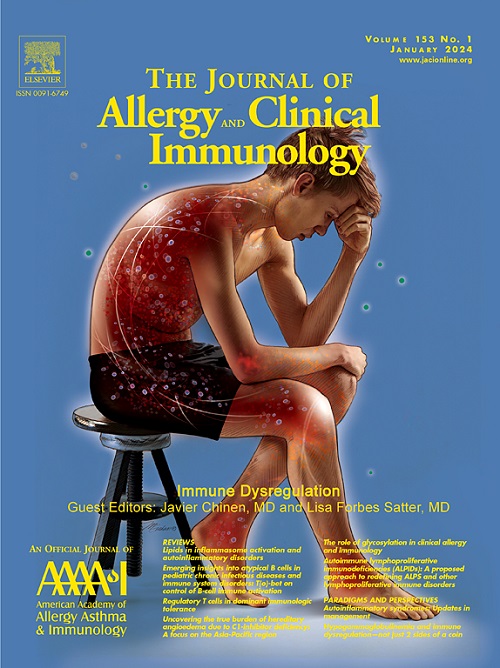Collagen XXIII (COL23A1): A novel risk factor for eczema herpeticum.
IF 11.4
1区 医学
Q1 ALLERGY
引用次数: 0
Abstract
BACKGROUND Eczema herpeticum (EH) is a potentially life-threatening disseminated skin infection caused by herpes simplex virus (HSV) in a subset of atopic dermatitis (AD) patients. The occurrence of EH in a subset of AD patients and its frequent recurrence imply the importance of genetic factors in its pathogenesis. OBJECTIVE We aimed to identify novel genetic risk factors for EH and to study their impact on HSV-1 infection. METHODS Using whole exome sequencing we identified a heterozygous single nucleotide polymorphism (SNP) in the COL23A1 gene (encoding Collagen type XXIII alpha 1 chain or COL23A1) that was associated with EH and validated it by PCR in a larger cohort. We studied the effect of upregulated COL23A1 expression on HSV-1 infection in primary keratinocytes and HaCaT cells and performed bulk RNA sequencing to address the underlying mechanism. RESULTS EH-patient-derived primary keratinocytes carrying this heterozygous SNP rs2973744 had elevated COL23A1 mRNA and protein levels as well as an increased susceptibility to HSV-1. Increasing the COL23A1 levels experimentally enhanced HSV-1 infection in human keratinocytes. COL23A1 overexpression elevated syndecan-1 and nectin-1 levels on the cell surface, which are HSV-1 attachment and entry factors, respectively, and downregulated genes involved in antiviral responses such as IL1R1, IL32, TLR4, IRF1, S100A9, C3, and CFH. CONCLUSION The SNP rs2973744 enhances COL23A1 expression in ADEH+-derived keratinocytes. Upregulation of COL23A1 promotes HSV-1 infection presumably by upregulating the HSV-1 attachment and entry factors syndecan-1 and nectin-1 on the cell surface and attenuating antiviral responses of keratinocytes.胶原蛋白XXIII (COL23A1):疱疹性湿疹的一个新的危险因素。
背景:疱疹性湿疹(EH)是一种在特应性皮炎(AD)患者中由单纯疱疹病毒(HSV)引起的潜在危及生命的弥散性皮肤感染。EH在AD患者亚群中的发生及其频繁复发暗示了遗传因素在其发病机制中的重要性。目的寻找EH新的遗传危险因素,并研究其对HSV-1感染的影响。方法采用全外显子组测序方法,在COL23A1基因(编码胶原型XXIII α 1链或COL23A1)中发现一个与EH相关的杂合单核苷酸多态性(SNP),并在更大的队列中进行PCR验证。我们研究了COL23A1表达上调对原代角质形成细胞和HaCaT细胞中HSV-1感染的影响,并进行了大量RNA测序以确定其潜在机制。结果携带该杂合SNP rs2973744的患者源性原代角质形成细胞COL23A1 mRNA和蛋白水平升高,对HSV-1的易感性增加。在实验中,增加COL23A1水平可增强HSV-1在人角质形成细胞中的感染。COL23A1过表达上调细胞表面分别为HSV-1附着因子和进入因子的syndecan-1和nectin-1水平,下调参与抗病毒反应的基因如IL1R1、IL32、TLR4、IRF1、S100A9、C3和CFH。结论SNP rs2973744可增强ADEH+源性角质形成细胞COL23A1的表达。COL23A1的上调可能通过上调细胞表面的HSV-1附着和进入因子syndecan-1和nectin-1以及减弱角质形成细胞的抗病毒反应来促进HSV-1感染。
本文章由计算机程序翻译,如有差异,请以英文原文为准。
求助全文
约1分钟内获得全文
求助全文
来源期刊
CiteScore
25.90
自引率
7.70%
发文量
1302
审稿时长
38 days
期刊介绍:
The Journal of Allergy and Clinical Immunology is a prestigious publication that features groundbreaking research in the fields of Allergy, Asthma, and Immunology. This influential journal publishes high-impact research papers that explore various topics, including asthma, food allergy, allergic rhinitis, atopic dermatitis, primary immune deficiencies, occupational and environmental allergy, and other allergic and immunologic diseases. The articles not only report on clinical trials and mechanistic studies but also provide insights into novel therapies, underlying mechanisms, and important discoveries that contribute to our understanding of these diseases. By sharing this valuable information, the journal aims to enhance the diagnosis and management of patients in the future.

 求助内容:
求助内容: 应助结果提醒方式:
应助结果提醒方式:


